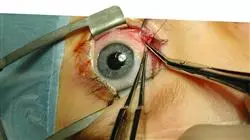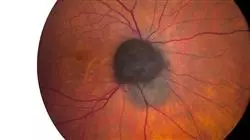University certificate
The world's largest faculty of medicine”
Introduction to the Program
Thanks to this Professional master’s degree you will obtain in only 12 months the most advanced update in diagnostic and therapeutic procedures in Oncological Ophthalmology"

In recent years, there has been notable progress in the performance of specific diagnostic tests that allow the ophthalmologist to perform an in-depth study of the anatomical and functional status. In addition, thanks to new pharmacological, physical or surgical therapies, treatments have been improved with a hopeful prognosis for the patient.
In this scenario, the professionals who wishes to be updated in the advances in this field will be able to do it through this university program designed by TECH. A program that will take the specialist to a complete update of their knowledge in Oncological Ophthalmology over 12 months.
It is an intensive program that delves from the first moment in Ocular Oncology, the most important radiological characteristics of intraocular and orbital tumor pathology, the main tumors of the eyeball and orbit, with special emphasis on the two most relevant malignant neoplasms of the eye: Uveal Melanoma and Retinoblastoma. In addition, this program goes a step further and offers the graduates a module oriented to the approach of the patient from the psychiatric and psychological aspect, which completes an already exhaustive syllabus in Ocular Tumors.
To achieve this goal of updating, students have access to video summaries of each topic, specialized readings or scenarios of simulated case studies that can be accessed comfortably from a digital device at any time of the day. Likewise, the Relearning system, based on the reiteration of content, will lead the professionals to progress naturally through the main concepts of this program and thus reduce the long hours of study.
A Professional master’s degree that provides the flexibility that the ophthalmologists require to make their daily work and personal activities compatible with a quality program, developed by an excellent team of specialists with a high level of competence in this field.
Get the most detailed information on the most sophisticated tumor radiobiology techniques used today"
This Professional master’s degree in Oncological Ophthalmology contains the most complete and up-to-date scientific program on the market. The most important features include:
- The development of practical cases presented by experts in Oncological Ophthalmology
- Graphic, schematic, and practical contents with which they are created, provide scientific and practical information on the disciplines that are essential for professional practice
- Practical exercises where self-assessment can be used to improve learning
- Its special emphasis on innovative methodologies
- Theoretical lessons, questions to the expert, debate forums on controversial topics, and individual reflection assignments
- Content that is accessible from any fixed or portable device with an Internet connection
An academic option that will lead you to implement the best strategies to address both systemic and locally advanced or unresectable diseases"
The program includes in its teaching staff professionals from the sector who pour into this training the experience of their work, in addition to recognized specialists from reference societies and prestigious universities.
Its multimedia content, developed with the latest educational technology, will provide the professionals with situated and contextual learning, i.e., a simulated environment that will provide an immersive education programmed to learn in real situations.
This program is designed around Problem-Based Learning, whereby professionals must try to solve the different professional practice situations that arise throughout the program. For this purpose, the students will be assisted by an innovative interactive video system created by renowned experts.
TECH adapts to your schedule and has designed a flexible problem that is compatible with your professional responsibilities"

A university qualification that will allow you to delve into the management of the main systemic treatment options for metastatic ocular tumors"
Why study at TECH?
TECH is the world’s largest online university. With an impressive catalog of more than 14,000 university programs available in 11 languages, it is positioned as a leader in employability, with a 99% job placement rate. In addition, it relies on an enormous faculty of more than 6,000 professors of the highest international renown.

Study at the world's largest online university and guarantee your professional success. The future starts at TECH”
The world’s best online university according to FORBES
The prestigious Forbes magazine, specialized in business and finance, has highlighted TECH as “the world's best online university” This is what they have recently stated in an article in their digital edition in which they echo the success story of this institution, “thanks to the academic offer it provides, the selection of its teaching staff, and an innovative learning method aimed at educating the professionals of the future”
A revolutionary study method, a cutting-edge faculty and a practical focus: the key to TECH's success.
The most complete study plans on the university scene
TECH offers the most complete study plans on the university scene, with syllabuses that cover fundamental concepts and, at the same time, the main scientific advances in their specific scientific areas. In addition, these programs are continuously being updated to guarantee students the academic vanguard and the most in-demand professional skills. In this way, the university's qualifications provide its graduates with a significant advantage to propel their careers to success.
TECH offers the most comprehensive and intensive study plans on the current university scene.
A world-class teaching staff
TECH's teaching staff is made up of more than 6,000 professors with the highest international recognition. Professors, researchers and top executives of multinational companies, including Isaiah Covington, performance coach of the Boston Celtics; Magda Romanska, principal investigator at Harvard MetaLAB; Ignacio Wistumba, chairman of the department of translational molecular pathology at MD Anderson Cancer Center; and D.W. Pine, creative director of TIME magazine, among others.
Internationally renowned experts, specialized in different branches of Health, Technology, Communication and Business, form part of the TECH faculty.
A unique learning method
TECH is the first university to use Relearning in all its programs. It is the best online learning methodology, accredited with international teaching quality certifications, provided by prestigious educational agencies. In addition, this disruptive educational model is complemented with the “Case Method”, thereby setting up a unique online teaching strategy. Innovative teaching resources are also implemented, including detailed videos, infographics and interactive summaries.
TECH combines Relearning and the Case Method in all its university programs to guarantee excellent theoretical and practical learning, studying whenever and wherever you want.
The world's largest online university
TECH is the world’s largest online university. We are the largest educational institution, with the best and widest online educational catalog, one hundred percent online and covering the vast majority of areas of knowledge. We offer a large selection of our own degrees and accredited online undergraduate and postgraduate degrees. In total, more than 14,000 university degrees, in eleven different languages, make us the largest educational largest in the world.
TECH has the world's most extensive catalog of academic and official programs, available in more than 11 languages.
Google Premier Partner
The American technology giant has awarded TECH the Google Google Premier Partner badge. This award, which is only available to 3% of the world's companies, highlights the efficient, flexible and tailored experience that this university provides to students. The recognition as a Google Premier Partner not only accredits the maximum rigor, performance and investment in TECH's digital infrastructures, but also places this university as one of the world's leading technology companies.
Google has positioned TECH in the top 3% of the world's most important technology companies by awarding it its Google Premier Partner badge.
The official online university of the NBA
TECH is the official online university of the NBA. Thanks to our agreement with the biggest league in basketball, we offer our students exclusive university programs, as well as a wide variety of educational resources focused on the business of the league and other areas of the sports industry. Each program is made up of a uniquely designed syllabus and features exceptional guest hosts: professionals with a distinguished sports background who will offer their expertise on the most relevant topics.
TECH has been selected by the NBA, the world's top basketball league, as its official online university.
The top-rated university by its students
Students have positioned TECH as the world's top-rated university on the main review websites, with a highest rating of 4.9 out of 5, obtained from more than 1,000 reviews. These results consolidate TECH as the benchmark university institution at an international level, reflecting the excellence and positive impact of its educational model.” reflecting the excellence and positive impact of its educational model.”
TECH is the world’s top-rated university by its students.
Leaders in employability
TECH has managed to become the leading university in employability. 99% of its students obtain jobs in the academic field they have studied, within one year of completing any of the university's programs. A similar number achieve immediate career enhancement. All this thanks to a study methodology that bases its effectiveness on the acquisition of practical skills, which are absolutely necessary for professional development.
99% of TECH graduates find a job within a year of completing their studies.
Professional Master's Degree in Oncological Ophthalmology
Oncological ophthalmology is a growing specialty, which deals with the diagnosis and treatment of intraocular and periocular tumors. Due to the complexity of these types of pathologies and the constant advancement of techniques, it is essential for healthcare professionals to specialize in this area. For this reason, TECH Global University offers the Professional Master's Degree in Oncologic Ophthalmology, a program that provides the necessary skills for the evaluation and management of ocular tumors. Throughout the postgraduate course, students deepen their knowledge of the different diagnostic methods, such as ultrasound, computed tomography or magnetic resonance imaging. In addition, they will be trained in the use of the most advanced therapies, such as intraocular chemotherapy, radiotherapy and microscopic surgery.
Specialize in the care of patients with ocular tumors
The Professional Master's Degree in Oncologic Ophthalmology is essential for those professionals who wish to specialize in the care of patients with ocular tumors. Thanks to this program, students will get the tools to apply a comprehensive management of this pathology, thus improving their ability to provide quality medical care. Likewise, they will be prepared both to lead medical teams in the area of oncologic ophthalmology and to work in highly complex centers.







